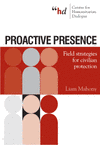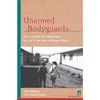- By Mahony and Eguren, Kumarian Press 1997. Also in Spanish and German.
Unarmed Bodyguards: International accompaniment for the protection of human rights defenders
Drawing on the experience of PBI in Sri Lanka and Guatemala, this book presents the theory and practice of PBI’s pioneering methods of human rights protection through international accompaniment of those whose lives and work are threatened by violence.
"The inspiring stories related here are particularly meaningful to citizens of the United States...because, in no small measure, the atrocities can be traced right back to Washington... There are many lessons here of great human significance, if we choose to learn them." Noam Chomsky, Professor of Linguistics at Massachusetts Institute of Technology
"An important contribution in the search for paths and alternatives in extreme and violent situations. These testimonies convey a sense of hope, born of solidarity and ripened through walking side by side with the people." Adolfo Perez Esquivel (1980 Nobel Peace Laureate)
For copies of the English version contact PBI UK or PBI USA. For the Spanish version, PBI Spanish State, and for the German version, PBI Germany.
Human Rights defenders under attack
By Liam Mahony, published by PBI UK 2006
Provides an overview of the theoretical framework behind protective accompaniment and how PBI has put this into practice since 1981 in Guatemala, El Salvador, Sri Lanka, North America, Haiti, Colombia, Indonesia, Mexico and Nepal.
Download the 25th anniversary publication Human Rights defenders under attack (1.2MB pdf)

- By Liam Mahony
Proactive Presence: Field Strategies for Civilian Protection
By Liam Mahony, 2006
The plight of civilians trapped in war is one of the greatest challenges of our times. All agree that providing relief alone is insufficient. The international response must equally focus on measures to provide greater protection for civilians. But what measures? Short of armed peacekeeping, one option is to deploy an unarmed international staff - human rights monitors, ceasefire observers, protection staff with humanitarian agencies - who through their presence deter abuses. To be effective, however, those deployed must pursue proactive strategies to deter abuse, encourage local actors and support reform efforts.
Drawing on the author’s experience of PBI, this manual describes these strategies. It is the first comprehensive study of these issues based on hundreds of interviews and analysis of nine separate missions, covering a range of institutional mandates.



